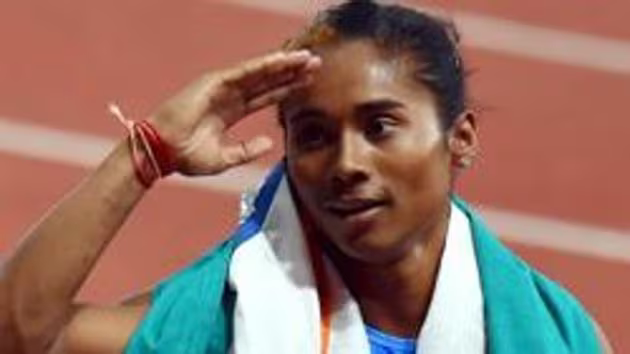Women cricketers in outer Delhi juggle school, tuition and housework and still find the time to practice on the field

Hima Das celebrates after securing silver medal in the women’s 400m final on athletics track event at the 18th Asian Games 2018 in Jakarta, August 26. Despite the Asian Games success of Swapna Barman, Hima Das, Harshita Tomar and Dutee Chand, the sight of girls playing a sport is rare anywhere(PTI)
When I first met them two years ago, the girls of the Saksham Sports Club were playing cricket in Shahbad Dairy, on the outskirts of Delhi, where they live. Some were barefoot, others in faded salwar kameez but all wore an unmistakable fierceness. When a boy involved in an adjoining match caught the 14-year-old Champa, she yelled at him: “Who told you to interfere in our game?”
The daughters of rickshaw pullers, factory workers and daily wage labourers, these girls are fighting for a basic right — to play. They juggle school, tuition and housework and still find the time to practise on the field.
Despite the Asian Games success of Swapna Barman, Hima Das, Harshita Tomar and Dutee Chand, the sight of girls playing a sport is rare anywhere, let alone at Shahbad Dairy, which despite the bucolic wholesomeness of its name, has one of Delhi’s highest crime rates.
With more than three of five of Delhi’s parks unsafe for women and girls, according to a December 2017 report by ActionAid, the message is clear: Public spaces belong to men.
When girls exist on the margins of play, they learn that public spaces belong to men. You see this exclusion in other realms of public life. Less than 10% of judges in the higher judiciary are women; only 11.3% in Parliament and at just 24%, India’s female labour force participation is among the lowest in South Asia.
“Sport is the most effective tool of empowerment,” says Suheil Tandon, who in 2013, founded Pro Sport Development (PSD), a social enterprise that uses sport for the holistic development of youth. PSD just completed a three-day workshop with 23 football-playing girls in Ajmer district. “Earlier these girls were not even allowed to leave their homes,” says Tandon. “Now they are leaders in their villages.”
In sport you cannot have caste-based segregation, say the girls. As a team they have chosen to boycott practices like child marriage. In other regions, PSD organises mixed gender matches that give girls the opportunity to play and, more crucially, boys the chance to appreciate the girls as teammates.
Respect is the word used by Santlal(he goes only by his first name), who, in 2016, founded the Saksham Sports Club that now coaches 75 girls. “In the beginning everyone passed mean comments,” says 17-year-old Kavita, the daughter of a vegetable vendor and captain of the cricket team. “Now when the boys see us with our bat and wickets, they ask us, ‘can my sister play with you’?”
This week the cricket team is playing a national-level tournament, says Santlal. Players have already been to Telangana and Chandigarh. But exposure is limited; none of the girls had heard of the Asian Games, let alone watched them on TV and most don’t even have access to a television. But, says, the still-fierce Champa, now 16, Mithali Raj, captain of women’s cricket team, is a role model. “I will go to college,” she says. “But only if it has a cricket programme.”
Namita Bhandare writes on social issues and gender
The views expressed are personal